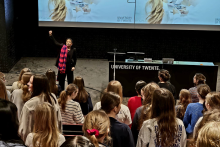Ambassadors' Network
The Ambassadors' Network advises the Executive Board on Diversity, Equity & Inclusion (DE&I) policies. In recent years, its focus has shifted from advancement of women in academia to diversity in a broad sense. The network consists of UT employees who critically assess and monitor the implementation of DE&I related measures within faculties and services.
As of September 2022, it has two co-chairs, Laura Vargas (project coordinator and student supervisor at the Mesoscale Chemical Systems group) and Roland van Rijswijk – Deij (adjunct professor of Measurement-based Internet Security in the Design and Analysis of Communication Systems group).
According to the 2022 Women Professors Monitor, the percentage of women professors at Dutch universities, including the University of Twente, is still too low - and not growing fast enough. Why do you think the growth is stagnating?
Roland van Rijswijk – Deij: ‘We are competing in an international arena. A lot of female talent goes abroad. That is certainly one factor. Furthermore, if you want to get talent, you need to look at the whole career path – starting at assistant professor or even earlier. I believe that this issue is on the radar, but how do we put it into practice? It takes time to change things. You can make official changes this year, but the impact will be visible in ten years.’
Is there anything that can be done to fast track the development?
‘I think we are moving in the right direction, but there are still steps that we can take to change the practices and the mindset. We should do this at the UT, but it also needs to happen nationwide. For example, every Dutch university has a slightly different tenure track system. And because we expect academics to get experiences at various places, this setup hinders people’s development. On top of that, we live in a culture where both partners work. At the same time, as an academic, you are expected to attend many meetings and networking events outside of work hours. That is why I think that being family friendly – to both parents – is absolutely necessary to level the playing field. We need to consider the reality of raising children, especially young children.’
'We need to consider the reality of raising children'
How do you think the UT is doing in this regard?
‘I think the UT is aware of this challenge, but we also do a lot of things just because that’s how we’ve always done them. To give an example: last week I attended a professor’s dinner. That is a regular event that happens in the evening, because getting a whole group of professors together is a scheduling nightmare. Attending is not required, but if you’re trying to advance your career, you essentially have to be there. You need to show your face. It starts with recognizing that this is challenging for people especially if they have a young family at home. One thing that we do well at the UT is organizing the leadership expedition, which is a training focused on wellbeing of teams. It builds a common understanding among people in leadership roles across the organisation. This can really bring about a change in working culture.’
The UT is below the national average when it comes to the percentage of women professors. Why do you think that is?
‘We are indeed at the bottom together with all other technical universities. It is a societal problem. In other countries it is a lot more common for women to go into STEM. Not encouraging girls to study STEM disciplines is engraved in the society and it will take a lot of time to change that in the Netherlands.
'Look abroad if you have to. The women exist'
However, there is something we can immediately improve here at the UT. When the issue of female representation comes up, I often hear that “we’d love to hire a woman for this position, but there aren’t any female candidates out there”. I don’t buy that. That is simply not true. Look abroad if you have to. The women exist. If I look at the enrolment in computer science, it is far from 50:50, but women are certainly there. They are no longer unicorns in the field – like when I studied in 1990’s, when there was only one woman in my class. We have a female cohort and we need to keep pushing because it is improving. Not having 50% of women among us is wasting talent.’
It is indeed a long-term issue that cannot be solved overnight, but is there anything specific that the UT could do to increase the number of women academics?
‘Invest in internal talent. Make sure that all the talented PhDs and Postdocs can develop their talent and their career here, at the UT. We tend to think that ‘grass is greener’ elsewhere, that external talent must be better, but we have so much talent right here. The new round of Hypatia chairs – positions open only to women – will be also open to internal candidates this time. Do more of that.’
You also mentioned that it’s important to offer a family-friendly environment. Could that be a way for the UT to attract more women professors?
‘Yes, being family-friendly means an environment where parents share care responsibilities, and where working hours align with family life. In vacancies for our group, we emphasize how family-friendly we are. We specifically mention possibilities for parental leave and support for families of all shapes and sizes. We want this to be clear to applicants regardless of gender. I think we could push the boat more as the UT. Even if we can’t change our policies due to the collective labour agreements, why don’t we communicate the importance of it? We could communicate on a national level that we believe childcare should be shared equally between both parents. Such an arrangement benefits the children and it creates equal opportunities. And it’s not like we’d be the first ones doing it. Other countries have shown it is possible. In Sweden it is completely normal for a man to take a year-long parental leave. We might not get to that point, but why not move in that direction?’
'Being family-friendly means an environment where parents share care responsibilities'
Female representation has been high on the agenda of the UT Ambassadors’ Network. How will the Network address the topic?
‘Our role as the Ambassadors’ Network is to give wanted and unwanted advice to the Executive Board. In 2023, we will focus on implementing the outcomes of the Inclusion Shaping Expert Group. While this is of course broader than gender diversity alone, female empowerment is a key factor in this. We will also hold meetings with faculty boards. If some of them say that ‘they can’t find women for the positions’, then we will have a difficult conversation with them. Because that answer is simply not good enough.’







